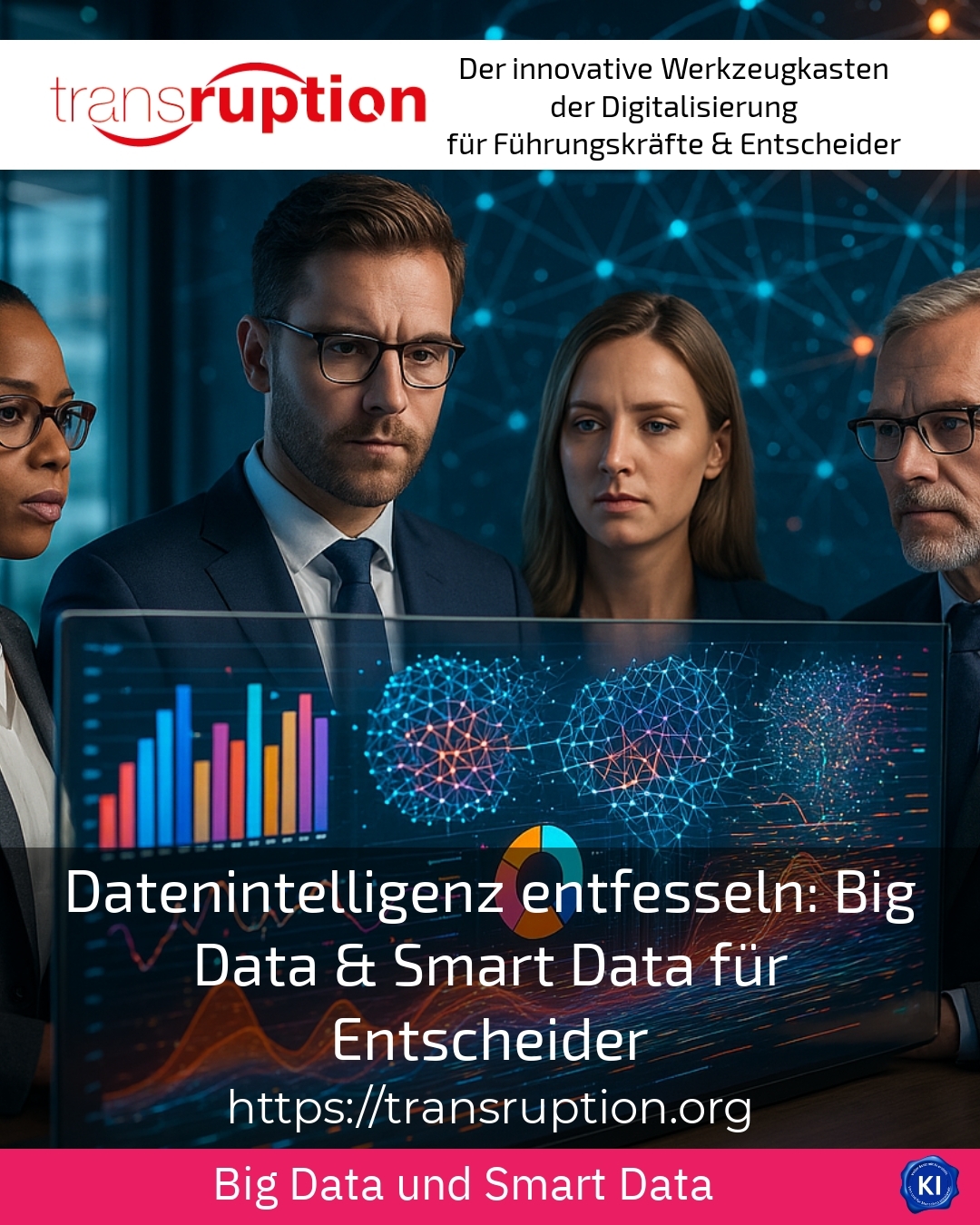In the digital age, companies are confronted with an enormous flood of data, often referred to as big data. However, true strength can only be realised through the use of data intelligence, a process that transforms raw data into usable insights. Decision-makers who understand how to extract smart data from big data create sustainable competitive advantages and make well-founded decisions.
Data intelligence: more than just data volumes
Big data refers to the extremely large, fast and diverse volumes of data that companies generate from a wide variety of sources. These range from customer interactions to machine sensors and social media. However, the sheer volume of data alone does not guarantee benefits. This is precisely where data intelligence comes in, using intelligent methods to filter, structure and process this raw data. The result is smart data - precise, usable information that supports decisions and optimises processes.
A retail company, for example, analyses millions of customer transactions. The challenge is to discover patterns from this mass of data that reveal trends in the purchasing behaviour of certain target groups. The information obtained enables personalised marketing campaigns that are tailored to precisely these customer segments.
Smart data is also being used in the automotive industry. Connected vehicles continuously generate sensor data. Thanks to data-intelligent analyses, only relevant values are selected for predictive maintenance. This allows maintenance to be planned at an early stage and downtime to be reduced.
In the healthcare sector, doctors use large amounts of patient data, laboratory results and data from wearables. Data intelligence helps to customise therapies and improve treatment processes.
Smart data as the key to optimising the use of big data
The difference between big data and smart data is not just the size of the data volumes, but above all their quality and relevance. While big data is considered a raw material, smart data is finely refined information that has already been optimised for specific questions. This is achieved through the use of algorithms, machine learning and artificial intelligence, which filter data in a targeted manner and place it in a meaningful context.
In logistics, data-intelligent solutions optimise supply chains. They use past transport data to identify bottlenecks and suggest alternative routes. This allows dispatch times to be shortened and costs to be reduced.
Data intelligence processes also lead to better risk analyses in the financial sector. Large volumes of historical transaction data are analysed to determine which patterns indicate payment defaults or attempted fraud. This enables banks to benefit from faster and more accurate decisions.
Another advantage of smart data is the real-time availability of important insights. For example, companies can use current customer data to react immediately to changes in the market and dynamically adapt their offers.
Practical tips for the integration of data intelligence in the company
1 **Focus on data quality:** Instead of collecting as much data as possible, companies should focus on high-quality and relevant data.
2 **Build interdisciplinary teams:** IT experts, analysts and specialist departments must work closely together to utilise data intelligently.
3. use automation:** AI-based systems can help to make data preparation and analysis more efficient.
4 **Take data protection and security seriously:** Compliance and data protection regulations must be strictly observed when processing smart data.
5 **Design data-driven processes:** Companies should actively integrate data-based insights into their decision-making processes and continuously adapt their strategies.
BEST PRACTICE at the customer (name hidden due to NDA contract) A medium-sized production company used data intelligence to analyse machine data from production. This made it possible to plan plant maintenance in a more targeted manner. The result was reduced downtime and improved production planning, which made a significant contribution to increasing competitiveness.
BEST PRACTICE at the customer (name hidden due to NDA contract) A telecommunications company filtered relevant patterns for churn prevention from the flood of customer data. With the help of data-intelligent analyses, targeted offers were developed that sustainably strengthened customer loyalty and minimised churn.
BEST PRACTICE at the customer (name hidden due to NDA contract) In e-commerce, data-intelligent tracking was used to record customer preferences more precisely. This made it possible to customise the product range precisely and significantly increase the conversion rate. The result was a more efficient marketing strategy with higher customer satisfaction.
Data intelligence as a trailblazer for sustainable decisions
Data intelligence unleashes the potential of big data by enabling companies to gain fast and meaningful insights from large and complex amounts of data. This allows decision-makers to optimise processes, identify trends and react in a targeted manner. Intelligent algorithms support data processing and create a solid basis for data-driven business models.
A well-thought-out strategy for utilising data intelligence can support projects and provide impetus for profitably navigating the flood of data. Companies in a wide range of sectors - from retail and industry to healthcare - benefit from greater efficiency and innovative solutions.
My analysis
Data intelligence is an essential skill for companies that not only want to collect data, but also utilise it intelligently. The key lies in using modern technologies and methods to process big data in such a way that high-quality smart data is generated. This enables well-founded decisions, a better customer approach and optimised processes. Focusing on the quality and relevance of the data is crucial to achieving effective results. Decision-makers benefit in particular when they integrate data-intelligent approaches into their corporate strategy in a targeted manner and can thus support projects with reliable findings.
Further links from the text above:
What is smart data - B2B smart data
Big data vs. smart data: is more always better? - Netconomy
Data intelligence: Big data and smart data for decision-makers - Sauldie
Big Data: The utilisation of large amounts of data - Lexware
Smart data: definition, application and difference to big data - O2 Business
For more information and if you have any questions, please contact Contact us or read more blog posts on the topic TRANSRUPTION here.















